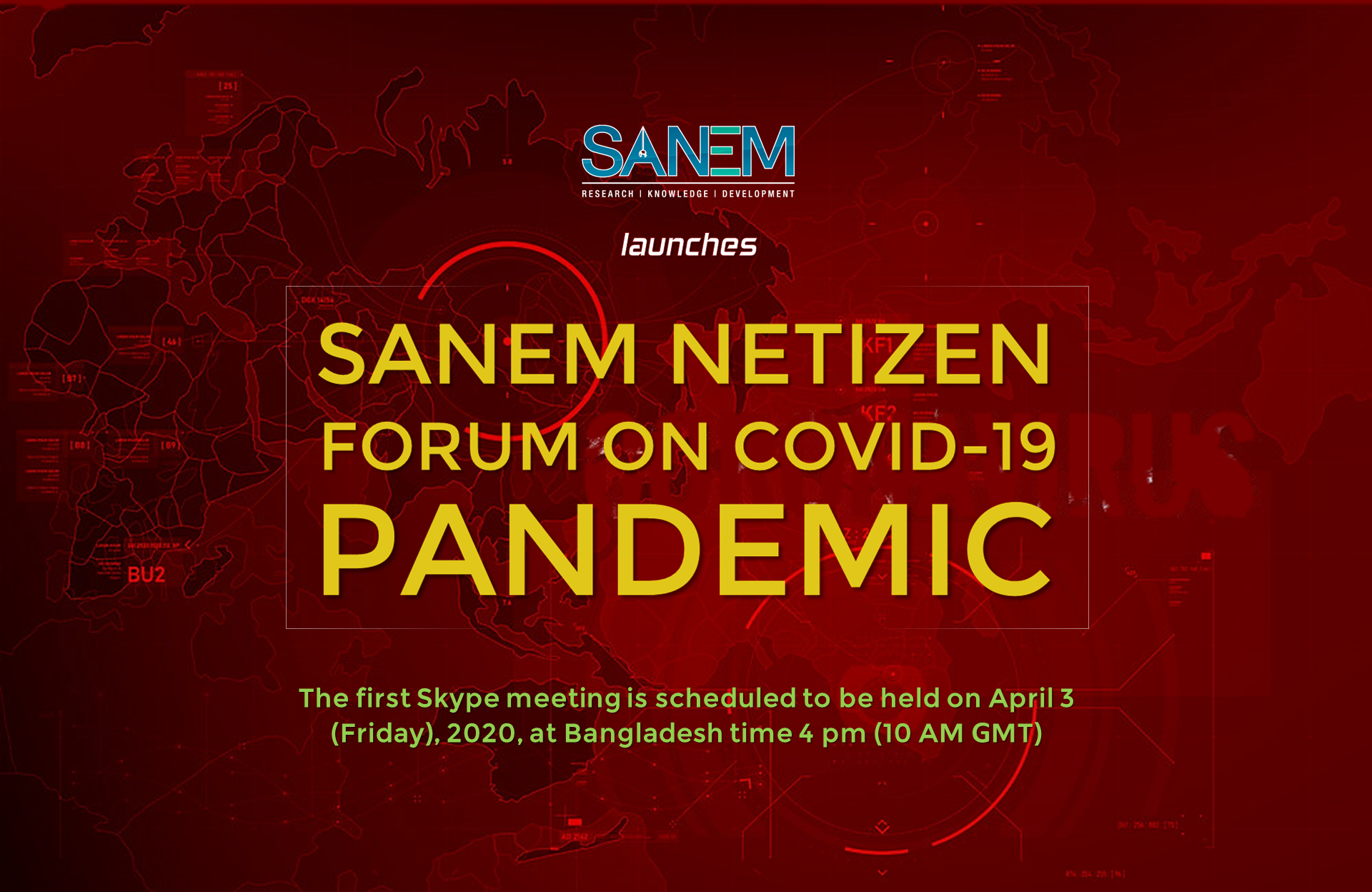Previous Events
SANEM Netizen Forum on COVID-19 | Episode 1
3 April 2020, Dhaka

As part of its social actions against the COVID-19 Pandemic, in an endeavor to create a space for meaningful online discussion among citizens on the various aspects of the present crisis, South Asian Network on Economic Modeling (SANEM) has launched the SANEM Netizen Forum on COVID-19 Pandemic. Meeting through SKYPE, the first episode of the forum was conducted on April 3, 2020, at 4 pm Dhaka time. With a participation of 22 individuals, representing different sections of the society, the discussion was moderated by SANEM’s Executive Director and Professor of Economics at University of Dhaka, Dr. Selim Raihan. Among others the forum was joined by Kazi Faisal Seraj, Country Representative of Asia Foundation in Bangladesh, Mr. Mahtab Uddin, Lecturer, Department of Economics, University of Dhaka and Mr. Sovik Mukherjee, Assistant Professor, Department of Economics, St. Xavier’s University, Kolkata. Graduate and undergraduate students of Bangladesh and two students from the UK and Turkey were also connected in the episode (the full list of participants is attached).
The discussion was commenced by Dr. Selim Raihan. Thanking the participants, he presented his observations on the short and long term impacts of the pandemic on the economy of Bangladesh and South Asia. He also informed the participants of SANEM’s proposal of a two-year recovery plan. As the discussion proceeded, following points were discussed in details:
1. According to government statistics, 20.5% of the country’s populations are poor. If the income threshold for the poverty line is increased by just 0.25 percent, the poor and vulnerable population would increase to almost 70 million. This huge population will be facing severe food crisis in the near future. The policymakers must prioritize this.
2. At present, 34% of the rural population and 10% of urban population of the country are under the Social Safety Net coverage. Under the current crisis, there is a need for large expansion of the Social Safety Net programs to ensure food security of the poor and vulnerable population.
3. The government should consider cutting down unnecessary expenditure to support the increased expenditure in the priority areas such as in Social Safety Net and Health Sector.
4. Lowering interest rate will have http://healthsavy.com/product/cialis/ limited impact on rising the private sector lending. Private sector credit growth was already on a declining trend before COVID 19, and in the post COVID situation, private sector credit may not take up even with the lower interest rate.
5. Government borrowing from the banking sector is already very high and further borrowing may lead to stifling monetary situation. In addition, liquidity in the banking sector with recent 9/6 policy is alarming.
6. Bangladesh has an appalling tax to GDP ratio of only 9%, making it very difficult to increase government spending on vital economic and social areas.
7. The government might have to increase the deficit in the upcoming budget. The policymakers must act boldly as there is no place for conventional thinking now.
8. Many immigrant workers have returned to Bangladesh and many who have not returned, have become unemployed. Diplomatic negotiation is urgent so that these workers can return to their work after crisis.
9. It must be ensured that the workers are benefitted from the stimulus packages announced by the government.
10. Government may re-visit the spending and implementation plans of the on-going mega-projects in the context of the current crisis.
List of Participants:
1. Dr. Selim Raihan, Executive Director, South Asian Network on Economic Modeling (SANEM), and Professor, Department of Economics, University of Dhaka
2. Mahtab Uddin, Lecturer, Department of Economics, University of Dhaka
3. Shoaib Ahamad, Programme Associate, South Asian Network on Economic Modeling (SANEM)
4. Faisal Seraj, Country Representative, The Asia Foundation
5. Sovik Mukherjee, Assistant Professor in Economics, St. Xavier’s University, Kolkata
6. Nazrul Islam, Lecturer, Department of Economics, Rabindra University, Bangladesh
7. Samir Kumar Paul, Development Professional, JAAGO Foundation
9. Farian Tahrim, Management Trainee Officer, Trust Bank Limited
10. Monira Parvin, Knowledge Management Specialist, Bangladesh Red Crescent Society
11. Sakib Imran Ali, Student, Bangor University, UK
12. Mahadi Hasan, Student, Bursa Uludag University, Turkey
13. Ashib Uddin Emo, Student, Jagannath University
14. Abdullah Al Noman, Student, Pabna University of Science and Technology
15. Golam Kibria Limon, Student, University of Rajshahi
16. Rafiul Ahmed, Student, Shahjalal University of Science and Technology
17. Tauhida Rahman, Student, University of Dhaka
18. Zahin Ferdous Maesha, Student, Bangladesh University of Professionals
19. Sabrina Shanta, Student, Pabna University of Science and Technology
20. Shadique Mahbub Islam, Student, University of Dhaka
21. Shaugat Ashraf Khan, Student, Shahjalal University of Science and Technology
22. Sumiya Rahman, Student, University of Dhaka
23. Jasia Tahzeeda, Student, Brac university
